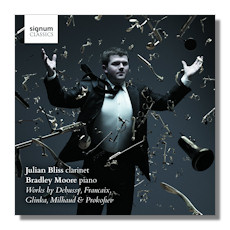
The Internet's Premier Classical Music Source
Related Links
-
Debussy Reviews
Glinka Reviews
Milhaud Reviews
Prokofieff Reviews - Latest Reviews
- More Reviews
-
By Composer
-
Collections
DVD & Blu-ray
Books
Concert Reviews
Articles/Interviews
Software
Audio
Search Amazon
Recommended Links
Site News
 CD Review
CD Review
Works for Clarinet

- Claude Debussy: Premiere Rapsodie
- Jean Françaix: Tema con variazioni
- Mikhail Glinka: Sonata in D Minor (arr. J. Bliss)
- Darius Milhaud: Clarinet Sonatine, Op. 100
- Serge Prokofieff: Sonata in D Major, Op. 94 (arr. J. Bliss)
Julian Bliss, clarinet
Bradley Moore, piano
Signum Classics SIGCD384
This is a delightful disc featuring mostly light music but of great variety and color, and in splendid performances. When you think about it, you don't encounter many recordings today devoted solely to clarinet works. Moreover, the handful that are issued usually don't feature music by so many different composers and of such high quality as found on this CD.
British clarinetist Julian Bliss (b. 1989) has selected an intriguing program of works. The first is the Debussy Premiere Rapsodie (1909-10), which exists in two versions: for clarinet and piano and clarinet and orchestra. This of course is the piano version. The work is a mixture of playful and dreamy music, with writing for the clarinet that sounds perfectly suited to its often mellow yet mischievous sonic character. It is a short piece (7:31) that exudes Debussy's Impressionist style, not so much by suggesting images but with evocations of moods that change quickly from a sort of languid nonchalance to childlike frolicking. The performance by Bliss and Moore is excellent, with all grade of dynamics, well-judged tempos, and impressive virtuosity – this is a quite challenging piece for the clarinetist.
The ensuing Tema con Variazioni by Jean Françaix is another brief work, lasting a minute or so longer. Though it dates to 1974, it could well have come from Debussy's era, but for some sassy sound effects that come near the end. The work opens with an upbeat theme that is followed by six variations. It is another difficult piece to perform, but once again Bliss and Moore turn in splendid work.
The Glinka Sonata in D minor was originally scored for viola and piano, but what is offered here is an arrangement by Bliss. At times the work sounds a bit like Schumann, and then seems to suggest Chopin. But the first movement dates to 1825 and the second to 1828, years when Chopin was a fledgling composer whose music was little known beyond his country's borders, and Schumann had yet to write anything significant. Though the piece is fairly serious, it is not emotionally probing or cerebral, instead presenting a rather stately main theme in the first movement that is contrasted by an upbeat lyrical melody which might have a few echoes of Mozart. Moving from Allegro moderato in the opening panel, Glinka offers a lyrical and mostly light Larghetto second movement. The music sounds livelier than the tempo marking suggests – at least in this performance – and the thematic goods are quite attractive. Bliss and Moore once again present about as compelling a performance as one could wish for.
The Milhaud Sonatine is a colorful, sassy and infectious work. Consisting of three short movements and lasting just over ten minutes, the piece is whimsical and rhythmically spirited in the outer movements, but deliciously dreamy and somber in the middle panel, probably the best of the three. Bliss and Moore seem to have the chameleonic ability to move effectively from one work to a strikingly different one: this clever Milhaud piece moves about 180 degrees away from the Glinka, and Bliss and Moore deftly capture its Gallic playfulness, its insouciance and the dark lyricism of the middle panel.
At nearly twenty-five minutes, the Prokofiev Op. 94 Sonata is the biggest work here and, while generally light, it also moves into territory not occupied by the other composers on the disc. The work has achieved a fairly high level of popularity both in its original version for flute and piano and in its subsequent transcription for violin and piano, Op. 94bis, which was published and retitled as Violin Sonata #2. Now the work is beginning to draw attention as a sonata for clarinet. In fact, this arrangement by Julian Bliss is actually the second such transcriptive effort: we have a concerto version for clarinet and orchestra by American composer Kent Kennan (1913-2003), which was issued in 1993 on a Centaur CD featuring clarinetist John Bruce Yeh with the Chicago Chamber Orchestra.
Anyway, Bliss takes the dreamy first movement main theme quite slowly, but catches all its sweet-and-sour lyricism in beautiful tones. The playful alternate theme has an attractive nonchalance in this rendering and the whole movement comes across quite effectively, making you wonder that maybe this clarinet version is as good or nearly as good as the original for flute. The second movement may lack the cutting edge of the original, but it's just as bouncy and mischievous, especially in this splendid performance. The bluesy middle section of the third movement is mesmerizing here and the finale brims with joy and triumph. A great performance by both players. Perhaps I haven't said enough about the pianist, though: Bradley Moore makes a fine partner (not just accompanist, as he is often the equal here) and he delivers the piano's role with great sensitivity and intelligence in each work. The sound reproduction on the disc is well balanced and very clear. The notes by noted Prokofiev biographer and musicologist Daniel Jaffe are very informative. If you like the clarinet, you certainly won't be disappointed by this fine recording. Strongly recommended.
Copyright © 2014, Robert Cummings




















